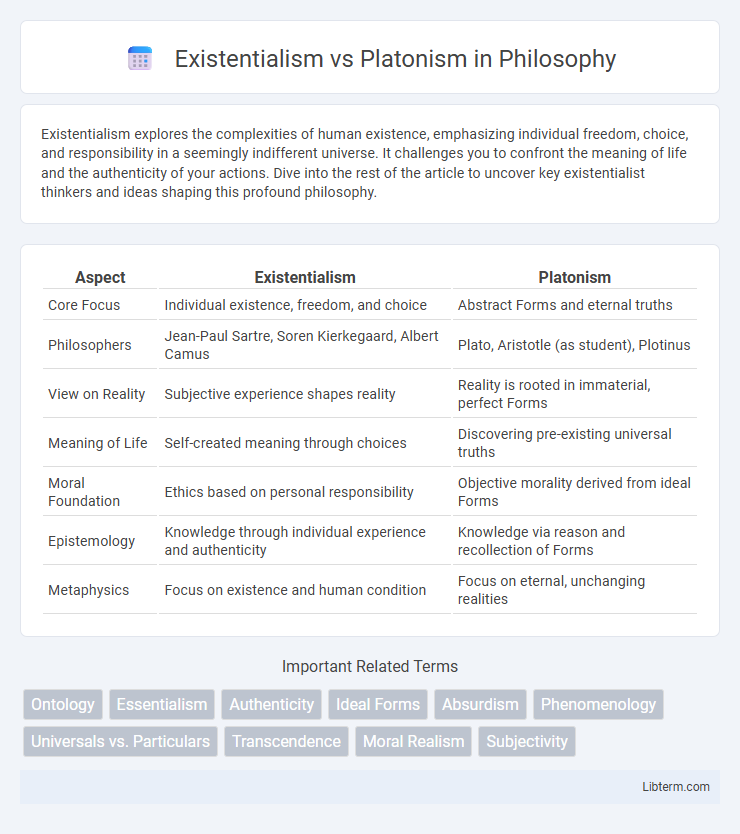Existentialism explores the complexities of human existence, emphasizing individual freedom, choice, and responsibility in a seemingly indifferent universe. It challenges you to confront the meaning of life and the authenticity of your actions. Dive into the rest of the article to uncover key existentialist thinkers and ideas shaping this profound philosophy.
Table of Comparison
| Aspect | Existentialism | Platonism |
|---|---|---|
| Core Focus | Individual existence, freedom, and choice | Abstract Forms and eternal truths |
| Philosophers | Jean-Paul Sartre, Soren Kierkegaard, Albert Camus | Plato, Aristotle (as student), Plotinus |
| View on Reality | Subjective experience shapes reality | Reality is rooted in immaterial, perfect Forms |
| Meaning of Life | Self-created meaning through choices | Discovering pre-existing universal truths |
| Moral Foundation | Ethics based on personal responsibility | Objective morality derived from ideal Forms |
| Epistemology | Knowledge through individual experience and authenticity | Knowledge via reason and recollection of Forms |
| Metaphysics | Focus on existence and human condition | Focus on eternal, unchanging realities |
Introduction to Existentialism and Platonism
Existentialism emphasizes individual freedom, choice, and subjective experience, arguing that meaning is self-created in an indifferent or absurd universe. Platonism posits the existence of abstract, eternal Forms or Ideas that represent the most real and perfect versions of phenomena experienced in the physical world. These contrasting philosophies explore the nature of reality and meaning, with existentialism grounded in human existence and Platonism rooted in ideal metaphysical structures.
Historical Origins and Key Figures
Existentialism, emerging in the 19th and 20th centuries, was shaped by key figures such as Soren Kierkegaard and Jean-Paul Sartre, emphasizing individual existence, freedom, and subjective experience. Platonism, originating in ancient Greece with Plato in the 4th century BCE, centers on the theory of Forms and the belief in an objective reality beyond sensory experience. The historical contrast highlights Platonism's focus on metaphysical ideals versus existentialism's stress on personal meaning and human agency.
Core Philosophical Principles
Existentialism centers on individual existence, freedom, and subjective experience, emphasizing personal choice and authenticity in an inherently meaningless or absurd world. Platonism asserts the existence of abstract, eternal Forms or Ideas as the true reality, with material objects being imperfect reflections of these immutable archetypes. While existentialism prioritizes concrete human experience and self-determination, Platonism emphasizes objective metaphysical truths accessible through reason and intellect.
The Nature of Reality: Ideas vs Existence
Existentialism emphasizes individual existence, freedom, and personal experience as the foundation of reality, asserting that meaning is created through living rather than pre-existing ideas. Platonism argues for a realm of perfect, immutable Ideas or Forms that constitute the ultimate reality, with the material world being a mere imperfect reflection. The debate juxtaposes concrete human experience and subjective existence against abstract, eternal truths as the core nature of reality.
Human Freedom and Responsibility
Existentialism emphasizes radical human freedom, asserting that individuals are wholly responsible for creating their own essence through choices, without any predetermined nature. Platonism, in contrast, views human beings as inherently tied to eternal Forms, suggesting that true freedom lies in recognizing and aligning with these objective realities. The existentialist perspective prioritizes personal accountability in an uncertain world, while Platonism advocates for moral responsibility grounded in universal, immutable truths.
Knowledge and Truth: Objective vs Subjective
Existentialism emphasizes subjective knowledge, asserting that truth is individual and derived from personal experience and perception. Platonism advocates for objective truth, positing that knowledge exists independently of human thought, accessible through reason and intellectual insight. These contrasting views highlight a fundamental philosophical debate between the relativity of human existence and the universality of abstract realities.
Ethics and Moral Frameworks
Existentialism centers on individual freedom, choice, and subjective experience as the foundation of ethics, emphasizing authentic living and personal responsibility without predefined moral absolutes. Platonism asserts that ethical truths exist as objective, eternal Forms or ideals independent of human perception, guiding moral behavior through the pursuit of these perfect Forms like Justice and Goodness. While Existentialism challenges absolute moral frameworks by valuing personal meaning-making, Platonism upholds a fixed moral order accessible through reason and philosophical inquiry.
Influence on Modern Thought and Culture
Existentialism, emphasizing individual freedom, choice, and subjective experience, has profoundly shaped modern literature, psychology, and existential therapy by challenging traditional values and encouraging personal authenticity. Platonism, rooted in the belief of abstract, eternal forms, has deeply influenced contemporary philosophy, mathematics, and political theory, reinforcing ideals of objective truth and the pursuit of knowledge. Both philosophies continue to impact modern culture, with existentialism promoting personal meaning in a fragmented world and Platonism supporting the search for universal principles.
Major Criticisms of Each Philosophy
Existentialism faces major criticism for its emphasis on subjective experience, often accused of promoting nihilism and neglecting objective moral standards. Platonism is criticized for its reliance on abstract Forms, regarded by critics as metaphysical constructs lacking empirical evidence and practical applicability. Both philosophies are debated for their contrasting approaches to reality: Existentialism prioritizes individual existence, whereas Platonism upholds eternal, unchanging ideals.
Conclusion: Reconciling or Contrasting Worldviews
Existentialism emphasizes individual freedom, choice, and subjective experience, while Platonism advocates for objective, eternal forms and absolute truths. Reconciling these worldviews involves recognizing the existential focus on personal meaning within a framework of universal ideals proposed by Platonism. Contrastingly, the fundamental gap remains between existentialism's fluid human experience and Platonism's fixed metaphysical realities.
Existentialism Infographic

 libterm.com
libterm.com